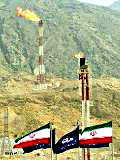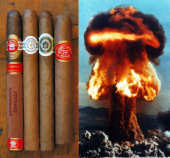 Threats by the United States to impose new sanctions against Iran include threats to take the Iran Sanctions Act out of mothballs and to start imposing sanctions authorized by that act against foreign companies investing in Iran’s petroleum sector. According to this report from the BBC:
Threats by the United States to impose new sanctions against Iran include threats to take the Iran Sanctions Act out of mothballs and to start imposing sanctions authorized by that act against foreign companies investing in Iran’s petroleum sector. According to this report from the BBC:
Oil firms may face fines and other penalties if they sign deals to develop Iranian reserves of oil and gas, a State Department source told the BBC. Nicholas Burns, one of the most senior officials at the State Department, has a blunt message for energy companies considering Iranian deals. “We have been going round to the major oil and gas firms to let them know that this law [the Iranian Sanctions Act] exists and that we implement it if they cross the line,” he said.
Under the Iranian Sanctions Act, the President may impose certain specified sanctions on foreign companies that make investments exceeding $20 million in a twelve-month period that materially enhance the ability of Iran to develop its petroleum resources. Among those sanctions are a denial of the company’s ability to import into the United States.
When the law was initially enacted in 1996, the E.U. filed a complaint with the WTO that this secondary boycott of companies doing business with Iran violated the obligations of the United States under the General Agreement on Tariffs and Trade. In response the E.U. and the U.S. entered into a Memorandum of Understanding that attempted to avoid a confrontation over the secondary boycott. Relying on the Memorandum, the Clinton administration waived sanctions under section 9(c) of the Iranian Sanctions Act with respect to a proposed investment of $2 billion by Total SA of France to develop the South Pars oil field in Iran. Subsequent investments by European companies in the Iranian oil sector have not been sanctioned by the U.S.
The re-institution of the secondary boycott will likely lead the E.U. to reinstate its WTO complaint. According to the previously mentioned BBC report:
A number of European energy giants – including Shell, Repsol of Spain and France’s Total – are at the moment considering multi-billion dollar contracts to develop Iranian gas fields.
This will put the U.S. in a difficult situation given its earlier arguments that secondary boycotts by Arab countries of firms doing business with Israel violate the GATT.
For an excellent discussion of the illegality of secondary boycotts under the GATT, see Professor Eugene Kontorovich’s comprehensive article in the Chicago Journal of International Law.

 Posted by
Posted by  Category:
Category: 

 Here’s more on Moore — which is a transparent ploy by me to start another food fight in the comments section to this post about whether Moore is a big fat liar or a champion of the people. Export Law Blog has no official position on whether Moore is a BFL or a COTP (notwithstanding the title of this post, which is simply an opportunity to make a cheap Shakespearean pun)
Here’s more on Moore — which is a transparent ploy by me to start another food fight in the comments section to this post about whether Moore is a big fat liar or a champion of the people. Export Law Blog has no official position on whether Moore is a BFL or a COTP (notwithstanding the title of this post, which is simply an opportunity to make a cheap Shakespearean pun)  Last week the Office of Foreign Assets Control (“OFAC”) released its
Last week the Office of Foreign Assets Control (“OFAC”) released its  It seems that the story that the prosecutors told to keep Mohammed Alavi in jail pending his trial on charges that he violated the Iranian Sanctions Regulations was just that — a story. On May 31, the trial court issued an
It seems that the story that the prosecutors told to keep Mohammed Alavi in jail pending his trial on charges that he violated the Iranian Sanctions Regulations was just that — a story. On May 31, the trial court issued an  The Bureau of Industry and Security (“BIS”) has issued a
The Bureau of Industry and Security (“BIS”) has issued a 

